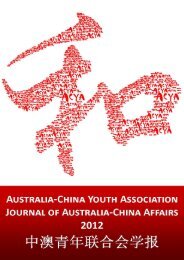a-chinese-stretch-of-the-imagination
a-chinese-stretch-of-the-imagination
a-chinese-stretch-of-the-imagination
Create successful ePaper yourself
Turn your PDF publications into a flip-book with our unique Google optimized e-Paper software.
There is now serious contest and rivalry across <strong>the</strong> Pacific be-<br />
tween America and China. This is not good for Australia. It’s not<br />
our contest, <strong>the</strong> American national interest in this contest is not<br />
our national interest, and taking <strong>the</strong> US side is not necessary to<br />
our relations with <strong>the</strong> US. This is not to argue that we shouldn’t<br />
have a close relationship with <strong>the</strong> US, or that we should side with<br />
China, or ditch a client relationship with <strong>the</strong> US only to have one<br />
with China. We need a close relationship with both and a client<br />
relationship with nei<strong>the</strong>r. It’s to say we have absolutely no national<br />
interest in being a party to this contest, even if it doesn’t come to<br />
military hostilities and regardless <strong>of</strong> arguments about whe<strong>the</strong>r or<br />
not <strong>the</strong> US is in decline. Some have suggested, Malcolm Turnbull<br />
among <strong>the</strong>m, 20 that Australia should pursue a hedging strategy<br />
with China, and that’s something we should discuss, so long as it<br />
means hedging both ways, for example on <strong>the</strong> fact that ANZUS does<br />
not commit <strong>the</strong> US to anything but an obligation to consult and is<br />
unlikely, ever, to engage <strong>the</strong> US in anything which is not a function<br />
<strong>of</strong> core US interests. But Australia is not hedging, it’s playing,<br />
on <strong>the</strong> American side. And I agree with Ge<strong>of</strong>f Raby, when he said:<br />
‘To execute a hedging strategy effectively and not create mutual<br />
suspicion and hostility, it is important to have a solid basis <strong>of</strong> trust<br />
between China and us. And that’, he said, ‘no longer exists.’<br />
We see here <strong>the</strong> problem I spoke about at <strong>the</strong> beginning. There is no<br />
sense <strong>of</strong> a firm Australian strategic hold on this issue, from a specifically<br />
Australian national interest point <strong>of</strong> view. The decision to<br />
commit to <strong>the</strong> US military strategy has <strong>the</strong> appearance <strong>of</strong> a passive<br />
conceding <strong>of</strong> <strong>the</strong> Australian interest, an acquiescence in an American<br />
view <strong>of</strong> security in <strong>the</strong> Pacific. On <strong>the</strong> part <strong>of</strong> <strong>the</strong> Australian<br />
political leadership, at least. But not, perhaps, on <strong>the</strong> part <strong>of</strong> some<br />
in <strong>the</strong> strategic, military and intelligence establishment in Canberra,<br />
who see <strong>the</strong>ir interests in enmeshment with <strong>the</strong>ir counterpart<br />
establishment in Washington, and <strong>the</strong>ir interest as equating to <strong>the</strong><br />
Australian national interest. That is to say <strong>the</strong> least questionable,<br />
as former Defence Department Secretary Ric Smith suggested at<br />
<strong>the</strong> Australian Institute <strong>of</strong> International Affairs conference in August.<br />
Or former chief <strong>of</strong> <strong>the</strong> army Peter Leahy, who has written, in<br />
an article titled ‘We must not get too close to <strong>the</strong> US’, that Australia<br />
should maintain <strong>the</strong> ability to say no to <strong>the</strong> US and separate itself<br />
from its actions. 21<br />
It is not <strong>the</strong> national interest, and some <strong>of</strong> our assumptions underlying<br />
this approach to <strong>the</strong> US alliance do not reflect our national<br />
reality, geographically or demographically. Our region is long<br />
since not a white European domain. And we are not demographically<br />
an Anglo white country. I think Keating was right. We have<br />
to find our security in Asia, not from it. As ano<strong>the</strong>r former chief <strong>of</strong><br />
现在中美之间正在太平洋上展开针锋相对的竞赛,这对澳大利亚而言并<br />
不是好事。这不是我们的竞赛,美国的国家利益也不是我们的国家利<br />
益,加入美国一方对于强化我们同美国的关系并非必要。这不是说我们<br />
不应当与美国保持很亲密的关系,也不是说我们应当和中国站在一起,<br />
或者抛弃与美国的关系,仅仅保留同中国的关系。我们所需要的是和这<br />
两个国家都建立亲密的关系,而这种关系并非客户关系。这也就是说我<br />
们没有任何国家利益的理由让我们加入到它们的竞赛中去,如果这种竞<br />
赛并没有导致双方产生军事敌意,并且和美国的衰退与否没有关系的<br />
话。包括麦肯·特恩布尔在内的一些人认为,澳大利亚应当对中国采取<br />
对冲策略 20 。我认为只要这种对冲是双向的,就应该可以讨论它的可行<br />
性。例子是美澳新共同防卫协定并没有让美国承诺任何事情,除了约定<br />
其有义务咨询澳方意愿之外,基本上没有可能让美方做任何一件不符合<br />
它重大利益的事情,而澳大利亚所做的并非对冲,而是选择成为美国的<br />
盟友。我同意芮捷锐的说法:‘为了有效地执行对冲策略,而不是相互<br />
猜疑和敌视,重要的是我们和中国之间需要有一个坚实的信任基础,然<br />
而这样的信任已不复存在’。<br />
在这里我又遇到了演讲一开始时所遇到的问题,即澳大利亚没有从本国<br />
利益出发的战略指导方向。加入美国军事计划的决定,看上去是被动地<br />
出让澳大利亚国家利益,是对美国的太平洋安全观的屈从,至少从澳<br />
大利亚领导层面看来是这样。但是在堪培拉的战略、军事和情报机构人<br />
士却不是这样认为,他们相信自己的利益和在华盛顿与他们地位对应的<br />
人物的利益一致,而且他们的利益等同于澳大利亚的国家利益。这只是<br />
大致状况,也就是说至少可以说是存在这种问题。正如前国防部秘书瑞<br />
克·史密斯今年8月在澳大利亚国际关系研究院大会上的讲话,以及前<br />
陆军总司令彼得·莱希在他的《我们一定要和美国保持距离》中所提到<br />
的:‘澳大利亚应当保持向美国说不的能力,并且避免被拉入美国的行<br />
动之中’ 21 。<br />
并不是国家利益,以及我们对于与美国建立同盟关系的构想没有反映我<br />
们国家无论地理上还是人口构成上的现状。我们所处的地区早已不是欧<br />
48 49



